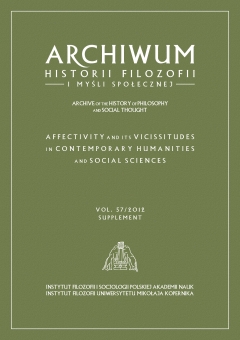Le vice et sa signification sociale
Vices and Their Social Meaning
Author(s): Dagmar SmrekováSubject(s): Ethics / Practical Philosophy, Semantics
Published by: Instytut Filozofii i Socjologii Polskiej Akademii Nauk
Keywords: Vice; virtue; elasticity of the order limits; Maffesoli; immorality and order;
Summary/Abstract: The word vice contains something unsettling as well as provoking in itself. We use to mark by it the negative qualities of character, which spur its holder to the resignation of doing the good or not to fulfill that what is morally appropriate. They encourage him/her to enter the area of something dark, perhaps even destructive. On the other side they usually serve as signals for the holder of his/her failure or exaggerating – of losing his/her temper in something what is crucial for a morally good character. Vices do concern us personally. Currently they become stronger, indispensably and without restraint they wedge into the public sphere, which has been until recently almost completely bound by civilized customs and demanded certain legitimacy. This fact leads to the problem with seemingly answered question of what is the good and how it can be justified. What if the suspicions stated by La Rochefoucauld or Nietzsche, regarding the good as a self-unsufficient ideal, interlaced also with other than virtue motives is legitimate? This uncertainty urges us to cast doubt upon earnestness of the approach based on criminalizing the vices. French sociologist M. Maffesoli urges to find the way how to deal with vices adequately, i. e. to learn to manage them, to attribute them social effectiveness. In our article we follow this idea in order to rethink the concept of ethics or redefine its content on the background of present elastic boarder lines between the possible and the allowed.
Journal: Archiwum Historii Filozofii i Myśli Społecznej
- Issue Year: 2012
- Issue No: 57supl.
- Page Range: 83-96
- Page Count: 14
- Language: French

